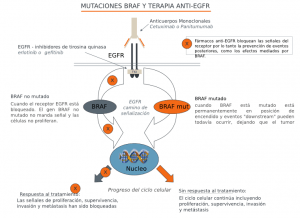BRAF is a gene that codes for a protein involved in epidermal growth factor receptor (EGFR) signaling that is important in cell proliferation, angiogenesis, cell migration, cell survival and cell adhesion. In normal cells, this signaling pathway is not activated unless the growth factor binds to the Epidermal Growth Factor receptor (EGFR). BRAF is activated by genetic variations, leading to uncontrolled cell division and growth.
BRAF GENETIC VARIATIONS IN COLORECTAL CANCER
BRAF genetic variations are detected in approximately 10% of colorectal cancers and are associated with a poor prognosis and lack of response to therapy with epidermal growth factor receptor (anti-EGFR) inhibitors. The activation of the most common genetic variation is V600E and the result is 10 times more BRAF activity than normal. This results in the promotion of the uncontrolled growth of cancer cells. BRAF V600E constitutes approximately 90% of all genetic variations.
DIRECTED THERAPIES
The EGFR gene is overexpressed in colorectal cancer and anti-EGFR treatments such as vectibix (Panitumumab) or Erbitux (Cetuximab) bind to EGFR and inhibit the growth and survival of cells expressing EGFR. Competitively inhibit the binding of EGFR ligands, which in turn prevents signal transduction leading to reduced cell growth and apoptosis. The effect of the BRAF mutation is to leave the BRAF gene product permanently in the “on” position. It can be observed in the diagram that BRAF is “downstream” of EGFR, inhibiting EGFR is going to have very little effect on tumors in which growth is being propitiated by mutations in the BRAF gene.

